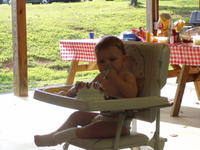"Because I Love You" By Max Lucado
Long ago in a land far away and unlike you’ve ever seen, there lived a wise man named Shaddai. Shaddai was a large man with a tender heart. He had bright blue eyes and a long, thick beard. When he laughed, which is something he often did, his cheeks would lift until his eyes because half-moons of joy. When he sang, which is something else he often did, everything stopped to listen. Tall aspens would bend. Squirrels, butterflies, and birds would pause. Even the children would turn when they heard his voice. And well they should. It was for them he sang.
And for the children, Shaddai had built a wonderful village. It was more than any child could dream. The children plunged into the sky-blue pond. They squealed as they soared high on the swings hung from the apple tree branches. They scampered through the meadows and giggled in the orchards. The sun never seemed to set too early, and the cool night sky always brought a quiet peace. And most of all, Shaddai was always near. When Shaddai wasn’t in the meadow or orchard with the children, he was in the workshop—with the children. They loved to be with him while he worked. They loved to smell the sawdust, hear him sing, and watch him carve a chair out of a log or make a table out of a tree. They would gather around him and take turns pressing their tiny hands flat against his great big one.
Every night he would gather the children on the grassy meadow and tell them stories. Fascinated, the children would listen as long as Shaddai—or their weary eyes—allowed. The children loved Shaddai and Shaddai loved the children. He knew each one by name, and he knew everything about them. He knew Lucy’s love of birds. He knew Roland’s fear of darkness. He knew Daphne was friendly and Spencer was shy. He knew Paladin was curious. When one of them called his name, he dropped whatever he was doing and turned. His giant heart had a hundred strings—each held by a different child. And Shaddai loved each one the same. That’s why he built the wall.
The wall was a high stone fence surrounding the village. Shaddai had built it, rock upon rock. The wall was so tall it stood high above Shaddai. Even if he stretched his arms as high as he could, he still couldn’t touch the top of the wall. He spent days building it. And as he built, he did not sing. A deadly forest stood outside the village. As Shaddai built the fence, he would often pause and look into the shadows beyond. Cruel thorns and savage beasts and hidden pits filled the dark forest. It was no place for the children Shaddai loved. “Beyond the wall is danger,” he would tell the children in solemn tones. “You were made for my village, not for the terrible land beyond. Stay with me. It’s safe here.” But in his heart he knew it was only a matter of time.
The day he placed the final stone on the wall, he returned to his shop, took a long aspen branch, sat down at his bench, and carved a staff. Shaddai stood the staff in the corner and thought, “I’ll be ready.” Sometime later a boy ran into Shaddai’s workshop. The sandy-haired child with searching eyes and restless energy brought the Maker both joy and concern. “Shaddai!” In one motion the Maker dropped his hammer and turned. “What is it Paladin?” The boy spoke in spurts as he gasped for air. “The wall…I found a…hole. It’s a big opening sir.” They boy’s hands stretched to show the size. “Someone could crawl through it.”
Shaddai pulled over a stool and sat down. “I knew it would be you, Paladin, my child. Tell me, how did you find it?” “I was walking along the walls searching for—” “Holes?” Paladin paused, surprised that Shaddai knew. “Yes I was looking for holes.” “So you could see out into the forest?” “I was curious Shaddai. I wanted to know why you won’t let us go out there. Why is it so bad?” Shaddai motioned for the boy to come to him. When Paladin came near, the Maker cupped the small face in his hands and lifted it so the boy would look directly into his eyes. The urgency of the look caused Paladin’s stomach to feel empty.
“Paladin, listen to me. The lands out there are not for you. They are not for me. A journey into the forest will hurt you. You were not made for those lands. Let your feet carry you to the many places you can go—not to the one place you can’t. If you leave here, you will not find the way back.”
Paladin spoke softly, “You will fix the hole then?”
“No, Paladin, I created the hole because I love you so much.”
“But you just said that you don’t want us to leave.”
“I don’t want you to leave. I want you to stay with me, but I did make the opening when I built this wall.”
“But if you don’t fix it, the children might leave.”
“I know Paladin. But I want the children to stay because they want to, not because they have to.”
Paladin didn’t understand. Uncomfortable, he turned to leave. He needed to think about what Shaddai had said. As he entered the sunlight, he looked back into the shop. There sat Shaddai, leaning backward, still watching. Paladin was confused. Part of him wanted the safety of Shaddai’s shop, while another part drew him toward the fence. He looked again into the shop. Shaddai was standing now—not moving, but standing. His large hand stretched out to the boy. Paladin turned quickly away, as if he hadn’t seen. He walked fast as he could, aimlessly at first, then purposely toward the fence. “I won’t get too near,” he said to himself. “I’ll just peek out.” Questions came as quickly as his steps. Why do I want to do what Shaddai doesn’t want me to do? Why am I so curious? Is it wrong to want to see beyond the fence?
By now Paladin was at the hole. Without stopping to think, he lay on his stomach and squirmed through just far enough to stick his head out the other side. “I’ll just take a quick look,” he told himself. “What could be wrong with that? Shaddai said he made the hole because he loved us. I wonder what he’s keeping from me.” As if his knees were moving on their own, Paladin crawled farther. Soon he was through the hole and on the outside of the wall. He rose slowly to his feet. For several moments he didn’t move. He wondered if something would come out of the trees to hurt him. Nothing did. He relaxed his shoulders and said out loud, “Hmmm…it’s not so bad. It’s nice out here. What was Shaddai worried about?”
Paladin began walking into the forest. Twigs snapped beneath his bare feet. Sweet flowers scented the air. “I don’t seen any scary creatures,” he thought. The trees were so thick he could barely see the sky. “Just a few steps into the woods, to see what it’s like” he said. After a dozen more steps, he stopped. He liked the wilderness and thought there was nothing to fear. For the first time in his young life, he believed that Shaddai was wrong. “Just wait until I tell the others.” And he turned to go back through the hole, but the hole was gone!
He stopped and stared. He only saw a solid wall. Paladin ran to the wall. Was this the spot where he had crawled through? Or was it somewhere else? He couldn’t remember. He ran a dozen steps one way and then a dozen steps the other. Nothing. Suddenly he heard a strange sound in the woods behind him. He swung around, but he saw nothing. Paladin looked into the forest. Now it no longer seemed friendly. It was dark and threatening, as if it were about to destroy him. Desperately Paladin searched the wall. He couldn’t climb over; he couldn’t break though. There was no way home. “If you leave here, you will not find the way back.” Shaddai’s words rang in his mind.
The boy’s eyes were wide with fear. He sat on the ground, hugged his knees to his chest, and began to cry. As Paladin huddled there, lonely and afraid, he remembered something else Shaddai had often said. “I love you so much.” Does he love me enough to come and find me? Wondered the boy. Will he hear me if I call to him? “Shaddai, Shaddai! I’m so sorry I didn’t listen to you! Please, come help me.” Paladin’s plea had been heard by the one who loved him, even before it was spoken. For as the boy left Shaddai’s workshop, the Maker had watched him as long as he could. When Paladin was out of his sight, Shaddai turned, not to take up his work but to remove his apron. He hung his tools on the wall. Then he reached into the corner and took the staff, the one he carved after he finished the wall.
Even before Paladin had reached the wall, Shaddai had left the shop. Even before Paladin had asked for help, Shaddai was on the way to give it. Even before the hole in the wall had closed, Shaddai had opened another. His strong hands pulled away the rocks until he could see into the forest. With his staff at his side, Shaddai crawled through the hole. He left the village he’d made and set out in search of his child.

 I like to have substance on my blog and not talk about the silly events of the day, but I can’t help myself. I went to McDonalds today because I saw an add on TV that promoted 2 McGriddle sandwiches for $2. I love getting deals at fast food places, so I bit. Let me tell you, I have found manna from heaven, and is in the McGriddle sandwich. Seriously, they were amazing. They combined the spicy sausage with the sweet taste of pancakes with pockets of syrup. I know, most of you couldn’t care less, but I had to share. So get out there and get some McGriddles while the deal lasts.
I like to have substance on my blog and not talk about the silly events of the day, but I can’t help myself. I went to McDonalds today because I saw an add on TV that promoted 2 McGriddle sandwiches for $2. I love getting deals at fast food places, so I bit. Let me tell you, I have found manna from heaven, and is in the McGriddle sandwich. Seriously, they were amazing. They combined the spicy sausage with the sweet taste of pancakes with pockets of syrup. I know, most of you couldn’t care less, but I had to share. So get out there and get some McGriddles while the deal lasts.


 I have often equated peace with safety. But safety does not exist in the absence of danger but in the presence of God. Peace that Jesus gives is not the absence of trouble, but is rather the confidence that He is there with you always. His arrival in this world was the first step towards world peace first with the Creator, then with one another.
I have often equated peace with safety. But safety does not exist in the absence of danger but in the presence of God. Peace that Jesus gives is not the absence of trouble, but is rather the confidence that He is there with you always. His arrival in this world was the first step towards world peace first with the Creator, then with one another.


1.gif) Basically he stated that smokers should not receive government-funded health care. The logic follows that if people are going to intentionally and continuously
Basically he stated that smokers should not receive government-funded health care. The logic follows that if people are going to intentionally and continuously 
 So what’s the solution? I’m not sure, but I think it involves giving people a different lens with which they can read and interpret the Bible. Too often people run to the Bible looking to justify their own preconceived notions instead of letting the Bible speak on its own. And at those times when they do come seeking, often they can’t break through the surface of the text to something deeper because they have no concept of context. I guess I am proposing that the church needs to do more education in exegesis. Every church member should be equipped with the tools to understand the background, context, and genre of any given passage. This includes historical stuff. This includes rituals and practices of the people involved. This includes original language information.
So what’s the solution? I’m not sure, but I think it involves giving people a different lens with which they can read and interpret the Bible. Too often people run to the Bible looking to justify their own preconceived notions instead of letting the Bible speak on its own. And at those times when they do come seeking, often they can’t break through the surface of the text to something deeper because they have no concept of context. I guess I am proposing that the church needs to do more education in exegesis. Every church member should be equipped with the tools to understand the background, context, and genre of any given passage. This includes historical stuff. This includes rituals and practices of the people involved. This includes original language information.  But I am doing all the work in that situation. The goal is to get each person to the point where s/he can do the work him/herself. Teaching and applying exegesis is like getting a new lens prescription. It makes things so much clearer, crisper and more enjoyable. Now comes the hard part—making such a dream reality.
But I am doing all the work in that situation. The goal is to get each person to the point where s/he can do the work him/herself. Teaching and applying exegesis is like getting a new lens prescription. It makes things so much clearer, crisper and more enjoyable. Now comes the hard part—making such a dream reality.


 Jeroboam realized that if the people returned to the Southern Kingdom they might waver. So he set up 2 golden calves in Bethel and Dan as worship centers for the Northern people. This way they would have no affinity for the South or reason for returning. He made worship convenient. Much of the sacrifice was taken out of the equation. The result was apostasy and idolatry.
Jeroboam realized that if the people returned to the Southern Kingdom they might waver. So he set up 2 golden calves in Bethel and Dan as worship centers for the Northern people. This way they would have no affinity for the South or reason for returning. He made worship convenient. Much of the sacrifice was taken out of the equation. The result was apostasy and idolatry.

 Jesus calls us all to be His apprentice. To follow after Him. To learn from Him. To be His disciples. He says that if you want to be called a Christian, you must be a disciple—an apprentice.
Jesus calls us all to be His apprentice. To follow after Him. To learn from Him. To be His disciples. He says that if you want to be called a Christian, you must be a disciple—an apprentice. 

 Such was the case after watching “Hotel Rwanda” while at camp. I am thoroughly changed to say the least. Here I am over a week after the fact, and I still have trouble putting words to what I am feeling. But my emotional outpouring could be at an all time high. Words such as anger, shame, frustration, and sadness begin to describe my state of mind.
Such was the case after watching “Hotel Rwanda” while at camp. I am thoroughly changed to say the least. Here I am over a week after the fact, and I still have trouble putting words to what I am feeling. But my emotional outpouring could be at an all time high. Words such as anger, shame, frustration, and sadness begin to describe my state of mind.  On Friday of camp, each family contributed something to the worship service. My group was in charge of the "Afirmation of faith." Thus, we came up with our own creed. The ideas are all theirs - I just organized and reworded it for clarity. Big props go out to Whitney, Angela, Logan, Tsedeye, Sam, Jordan, Robby, Oliyad. We call it the Malaria Creed because we called our family "Malaria." Hope you enjoy.
On Friday of camp, each family contributed something to the worship service. My group was in charge of the "Afirmation of faith." Thus, we came up with our own creed. The ideas are all theirs - I just organized and reworded it for clarity. Big props go out to Whitney, Angela, Logan, Tsedeye, Sam, Jordan, Robby, Oliyad. We call it the Malaria Creed because we called our family "Malaria." Hope you enjoy. There is a great scene from
There is a great scene from  The theme for this past week of High School camp was “Lost.” The idea was to vividly portray Peter’s concept in his first epistle that we are resident aliens in a strange and foreign place, but that our lives should still be exemplary.
The theme for this past week of High School camp was “Lost.” The idea was to vividly portray Peter’s concept in his first epistle that we are resident aliens in a strange and foreign place, but that our lives should still be exemplary.